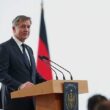A group of migration experts has harshly criticized Germany’s refugee policy. The policy is based on several false assumptions, is often inconsistent and creates unrealistic expectations, according to the report “Global Flight 2025” which was presented in Berlin on Monday.
According to the report, Germany’s refugee policy is not adequately addressing global challenges. The number of asylum applications in Germany and Europe has already seen a significant decline after the exceptional year of 2023. Municipalities are breathing a sigh of relief and many reception capacities are being reduced. Additionally, it can be observed that the integration of refugees over the past decade has been “largely successful.” Nevertheless, the coalition agreement between CDU, CSU and SPD continues to prioritize a restrictive refugee and asylum policy.
“The national limitation of the discussion is even hindering real solutions” said Franck Düvell, one of the editors of the report. From the perspective of flight research, the German policy should move beyond a crisis mode and break free from its “internal perspective” depoliticize the debate and develop a long-term and globally oriented strategy. “The complex and global issue of flight must be addressed by politics with cumulative and internationally coordinated solution approaches. Symbolic measures that are limited to Germany and its borders are not suitable for this purpose” added editor Benjamin Etzold.
A focus of the report is the topic of refugee camps. These could serve as part of the Common European Asylum System and have both administrative and deterrent functions. Although intended as temporary and often provisional accommodation, they often become permanent.
The report “Global Flight” is produced annually as part of the FFVT project. This is a collaboration between the BICC, CHREN, IDOS and IMIS institutes.





